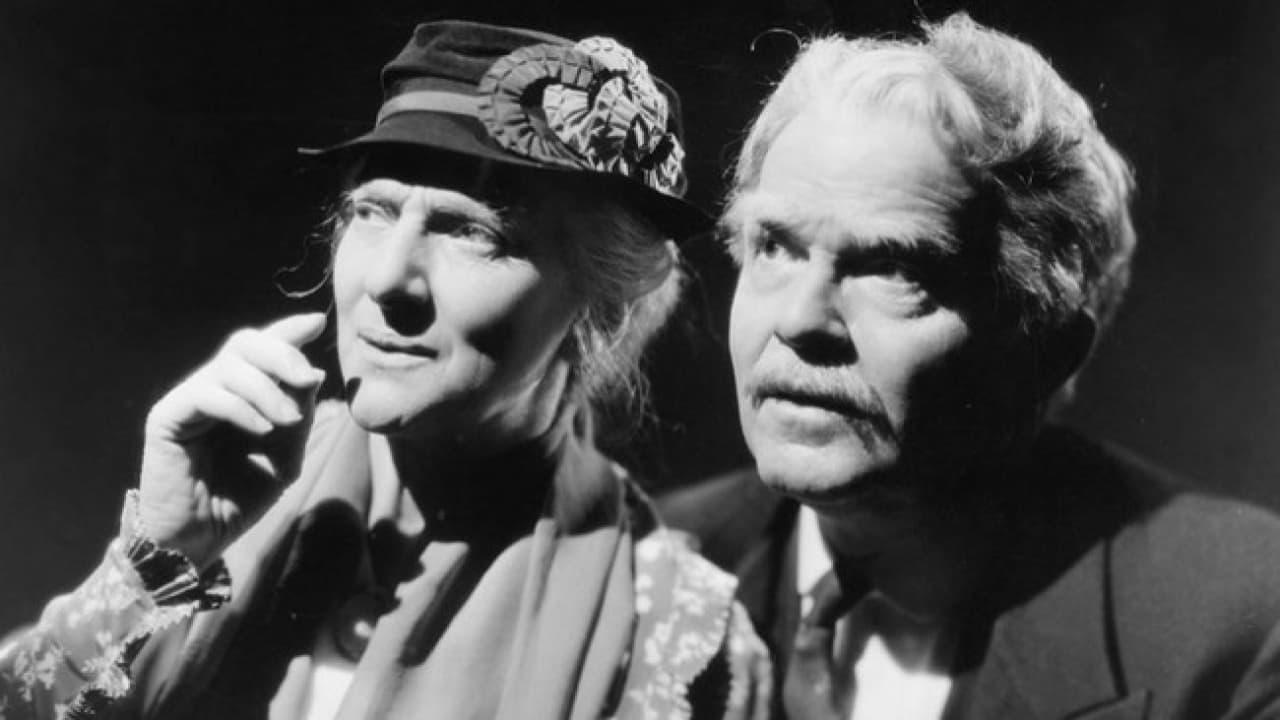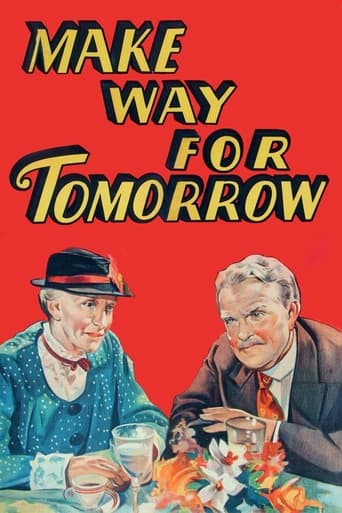

Highly Overrated But Still Good
... View MoreExcellent, Without a doubt!!
... View MoreThe film makes a home in your brain and the only cure is to see it again.
... View MoreGreat movie. Not sure what people expected but I found it highly entertaining.
... View MoreSaid to have inspired Tôkyô monogatari (1953) (with clear similarities between both stories), McCarey's simple story about an incredibly cute elderly couple forced to separate in dire circumstances is utterly heartbreaking. It is incredibly moving, perhaps because one can't help but reflect on their own life while watching it. The acting by the two leads is enchanting and those final 20 minutes are some of the most beautiful and heart-rending moments ever put to celluloid.I said heart twice in this review because this film had so much of it and it was evident in every frame. An overlooked minor gem of the early Golden Age and one that anyone who loves the power of movies should "Make Way for". Maybe today... maybe tomorrow... soon. Incredible.
... View MoreI'd heard of this film for years and always wanted to see it. I got my chance on TCM tonight and I wasn't disappointed. What a wonderful, heartbreaking little film. It's definitely a tearjerker, but the film is also filled with delightful humor, especially in the scene where the doctor calls on Victor Moore. Come to think of it, I was laughing so hard that I found myself crying during this scene as well. Both Moore and Beulah Bondi are a delight as the elderly couple and their scenes together at the end, at the hotel, are perfection. Another highlight is the scene where Thomas Mitchell must tell his mother (Bondi) that they may have to put her in a home and she turns the tables on him by making him think it was her idea. It's just wonderfully and touchingly acted by two terrific performers playing mother and son. The script, direction and fine acting from the cast all come together to make this picture a gem that is still relevant today. Be sure to catch this movie if you can - you'll be glad that you did.
... View MoreAnita (Fay Bainter) and Barkely (Victor Moore) are living comfortably in a large house which is soon to be foreclosed on. The couple calls a meeting with their children (there are five, but only four show up for the bad news) to tell them that they will have to be moving out. The situation, how to care for parents when they need help as they get older, is very much a contemporary concern. It seems that with a little tweaking this story could be updated to 2015, but this movie plays it so straight that I am not sure it could be made now. "Nebraska" comes to mind, but it has a lighter touch.There was not much of a safety net in place In 1937--Social Security had yet to write its first check--so financial considerations were then often the instigators for a family's facing taking care of parents, while age itself is a common instigator now. But the resultant experiences are the same. In the movie the parents are split between two of the children's families. The younger people have their own lives, and dealing with an older person landing in the family is difficult, for both the children and the parents. What happens is played out in a realistic way and is completely understandable. One is tempted to judge the children as selfish, but there are really no enemies here.I found a lot of the scenes to be simultaneously sad and humorous. For example, Anita gets on the phone during her daughter's teaching a bridge class and is so loud that an awkward silence falls over the entire class of a couple dozen people. Only one land line per house and no cell phones then.Some delights are to be had for a contemporary audience such as seeing how people dressed in 1937--the women's hairstyles, dresses, and hats are so appealing that it makes me think that we have lost a lot in having moved to casual comfort. At the age of 70 Anita and Barkley are viewed as being quite old. This is hard to accept until you understood that the average lifespan in 1937 was about 62. So, an updated version would have to have the old couple be in their 80s. The picture quality and sound on the Criterion Collection DVD are remarkably good.Be aware that Orson Welles called this the saddest movie he had ever seen.
... View MoreEvery now and then, TCM rebroadcasts Leo McCarey's MAKE WAY FOR TOMORROW. And every time it airs, I have to ask-- are conditions for elderly folks better now than they were in 1937?This story haunts me a bit, I must confess, because I don't think conditions have improved too much in America since the film was made and first seen. We have just as many older folks in our country living at or near the poverty level as we ever did.The phrase 'over the hill and to the poor house' is just as relevant as ever. Except one main difference is that the plight of senior citizens is no longer viable subject matter for movies in age- conscious Hollywood.
... View More